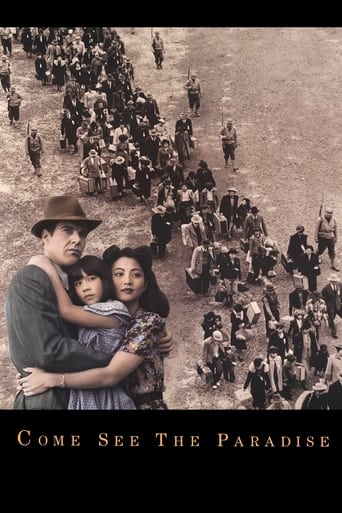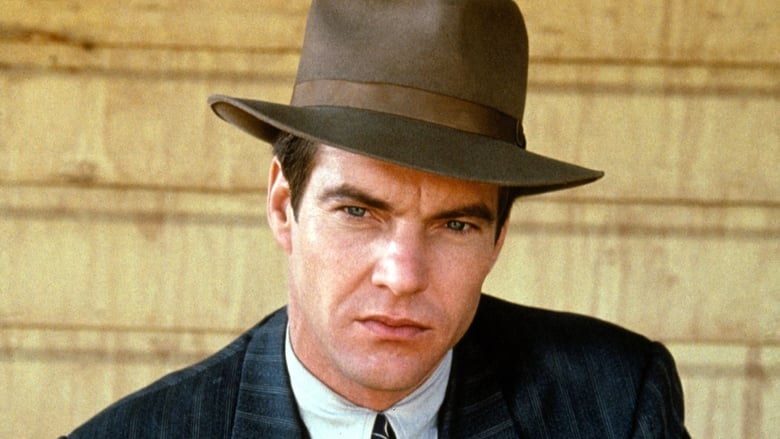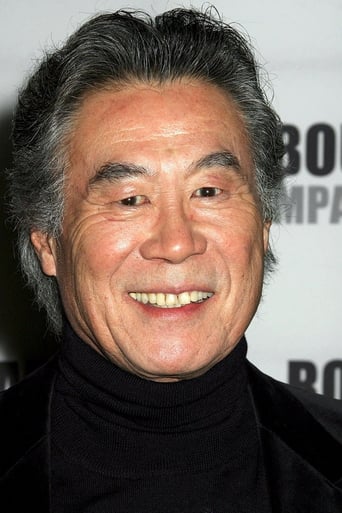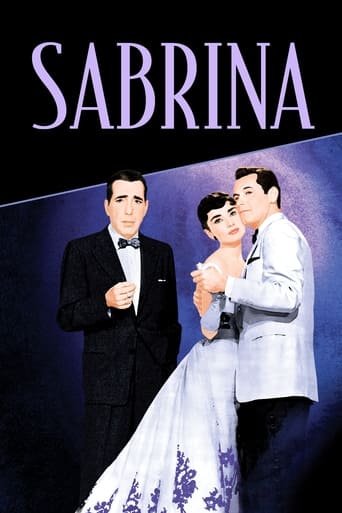Come See the Paradise (1990)
In this drama from director Alan Parker, on-the-lam Jack McGurn flees to Los Angeles and takes a job as a projectionist at a movie theater owned by a Japanese-American man. Jack falls for the owner's daughter, Lily, but they are forced to elope to Seattle when her father forbids the relationship. The couple marry and have a daughter, but when World War II breaks out, Jack is powerless to stop his new family's forced internment.
Watch Trailer
Free Trial Channels
Cast


Similar titles
Reviews
Did you people see the same film I saw?
It's fun, it's light, [but] it has a hard time when its tries to get heavy.
Blistering performances.
Mostly, the movie is committed to the value of a good time.
While the main plot line focuses entirely too much on the love story between Jack and Lily, there are some parts of the film that make it worthwhile.There was some redeemable aspects of the film. The setting shown after the Japanese were put into the camps was particularly powerful. We were able to see the vandalism and racism targeted at them during the weeks before internment, as well as the ghost towns left behind when they were forced out.. Some of the stereotypical responses of people who are put in camps were displayed in this picture. The father, an older man with a great sense a purpose before internment, completely lost his way in the camp. In Santo Tomas, where Americans were interned in the Philippines, there were similar instances of important men crumbling under the camp setting. The mother, who was not allowed to become a citizen of the United States, was told she could not help make camouflage military nets, even though she just wanted to be doing something and was not working for pay like her daughters. Though boredom is not the worst thing a person interned could experience, it shows how restricted they were. She simply wanted something to do but was not allowed because she was Japanese. The son, Charlie, developed a deep connection to his ancestor's homeland of Japan though he had never even been there and spoke little Japanese. The targeting and persecution forced him to embrace and learn more about his heritage and ultimately return to Japan. And opposite him was the son, Harry, who joined the U.S Army and died in service. Harry, a rational man who tended to err on the side of caution, did what he thought was safest for him, though it turned out to be the cause of his death. The different outcomes of these characters shows the ways people can react to internment, even within the same family.
Come See The Paradise is an insult to the experiences that Japanese Americans and millions of other interned people have experienced. The film depicts the unconstitutional internment of Japanese American citizens and immigrants during World War II, but only does so through the story of an interracial couple. While the film could have addressed the social conflicts that an interracial couple would have faced at the time (and too often still face today), it falls short of truly depicting the American hatred for Japanese immigrants during World War II. The film spends entirely too long on the relationship between Jack (Dennis Quaid) and Lily (Tomita Tomlyn), and far too little time on the ways in which internment affected Japanese people living in America during and after internment. Although this movie is not anything close to what it could have been, there is a certain amount of credit that should be given to the producers and directors for portraying the lives and struggle of Japanese-American citizens and immigrants in their most dire times. It is important to be able to represent and confront the atrocities that America has committed in the name of freedom, but this is not an entirely accurate representation. The film shows only a limited amount of struggle that the Japanese citizens underwent leading up to their internment. It seems that many of them are extremely willing to go away to these camps, selling their belongings and even refusing offers that are deemed too low for certain items. There is only a brief instance of despair before the family leaves for the camp when Lily tells the family to smash the record players. When they leave the platform and say goodbye to Jack, they seem hopeful that they would be seeing him extremely soon. Although this movie is not perfect by any stretch of the imagination, it does address a few meaningful aspects of camp life. The depiction of Mr. Kawamura's decline is quite representative of the way in which the camps and the country stripped away any sense of belonging and pride from the Japanese citizens and immigrants. Mr. Kawamura shows what the camp did to many and that there was little to live for once interned. Additionally, Charlie's rebellion against the American government demonstrates the struggles that many faced in their situation. Many faced the difficult choice of turning their backs on a country and a life that was all they knew, but were forced to do so because of the injustices that the American government was doing to them and their families. Finally, the scene in which Lily exclaims to a guard that the camp was nothing but an outdoor prison was particularly meaningful because it contradicts the American propaganda that the camp was a place that the Japanese citizens "wanted" to be. Although there are a few powerful scenes and narratives that are sprinkled throughout the movie, overall, it fails to be an accurate depiction of internment.
"Come See the Paradise" is nothing short of an insulting representation of what occurred in Japanese internment camps during World War II. While there are some redeeming qualities, it is masked by the incredibly awkward sexual interactions between Jack and Lily and the racial insensitivity. It is incredible that anyone who reviewed the film before letting it be shown in theaters would think that making a joke about Chinese people eating dogs was appropriate for the context of the film. One of the main questions I have about the film is why Dennis Quaid's character was necessary and if the director thought Jack was necessary, why did they not include the interrogation of Jack in the movie? This would have increased the quality of Jack's character tenfold. The red scare was a huge part of the time period and to reference it without developing the topic further was very confusing. There are only two semi redeeming plot lines that occur during the film that can somewhat accurately portray what it may have been like to be in a camp: Mr. Kawamura's rapid decline in the camp and Charlie's turn towards Japanese allegiance. Mr. Kawamura's rapid loss of self-respect and sense of self is an accurate portrayal of what happened to many people within camp systems because it showed how camps systematically could break people's psyche. Charlie joining the JCL, shaving his hair, and being sent to Tulley can be seen as a representation of the transformation of self within the camp. Charlie, having lost a sense of purpose within the camp system, found a new purpose by directing his allegiance to Japan. Many people have little knowledge about Japanese internment camps and this movie had the opportunity to introduce people to camps in a way that was representative of the camp system but failed to do so. The audience doesn't even see the camp until halfway through the film and the buildup to the camp is focused mostly on the relationship between Jack and Lily. Overall, I wouldn't recommend anyonesee if this movie unless the purpose was to point out why Hollywood is unable to do movie about camps well.
It's 1936. Jack McGurn (Dennis Quaid)'s wife had gone back to Ireland after losing their unborn child in an industrial accident. He is an union "sweatshop lawyer" who gets run out of Brooklyn after he disagreed with burning down a theater. He comes to join his brother Gerry in L.A. and eventually gets a job at a Japanese theater in Little Tokyo. He falls in love with the owner's daughter Lily Kawamura (Tamlyn Tomita). Her father forbids her and she runs away to get married in Seattle. It was illegal in California at the time. He gets into trouble trying to organize the cannery plant that he works at despite her objections. She goes back to her parents right when Japanese forces attack Pearl Habor. The police arrests all the first generation men. Jack rejoins his family in L.A. The family is interned and Jack is drafted.The movie moves deliberately. It takes its time to show the cultural differences and give the romance some space. It's a bit slow but it works as an old fashion romantic film. It doesn't really heighten the drama more than a simple melodrama level. The running time is over two hours long and probably would work better with less. This starts as a fine love story about Jack and Lily but that drama fades into the background in the second half. The camp part of the movie becomes more about telling different aspects of life through the family members.


















